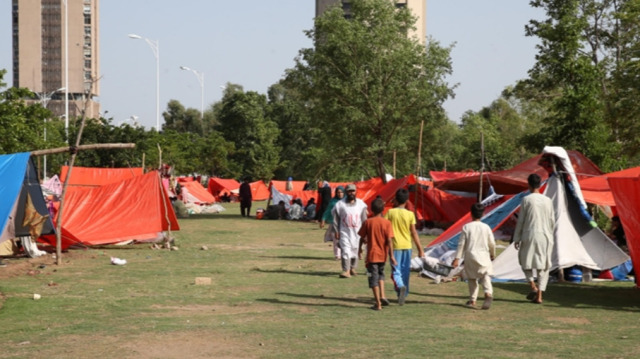
Over 700,000 Afghans have arrived in Pakistan since Taliban retook control of Afghanistan in 2021
The Pakistani government’s latest announcement on expelling all undocumented foreigners from next month has put hundreds of thousands of Afghans in jeopardy.
"I am doing business and have three big textile shops and have spent millions of rupees to establish this business in Pakistan. What I will do now? Who will buy it while they are deporting us?" said Jandullah, an Afghan businessman.
Many Afghans in Pakistan own businesses and live in its main cities and some small towns.
A large number are also living in refugee camps in Khyber Pakhtunkhwa and Balochistan provinces.
According to Jandullah, thousands of Afghans are engaged in the textile, transport and hotel businesses.
"Who will pay us the exact price if we are selling our businesses at this time, as everyone knows the government is expelling us?" he said.
On Wednesday, Balochistan's Caretaker Information Minister, Jan Achakzai, warned that the government will confiscate the properties and businesses of undocumented foreigners who had not left the country by Nov. 1.
However, the United Nations High Commissioner for Refugees (UNHCR) opposes the Pakistani government’s plan to expel undocumented Afghan refugees.
"Any refugee return must be voluntary and without any pressure to ensure protection for those seeking safety," UNHCR spokesman Qaiser Khan Afridi told Anadolu.
He added that the UNHCR is ready to help and support the Pakistani authorities in finding a suitable solution.
Pakistan has been hosting a large number of Afghan refugees since the 1979 Soviet invasion of Afghanistan, with nearly 2.9 million still living in the country.
According to a report by the Ministry of States and Frontier Regions (SAFRON) which deals with Afghan refugees, more than 1.3 million Afghan refugees have Proof of Registration (PoR) cards while over 800,000 have Afghan Citizen Cards (ACCs).
The report said, however, that 700,000 Afghans are living in the country without any documents.
Among the registered Afghans, 52% are living in northwestern Khyber Pakhtunkhwa province bordering Afghanistan.
Another 321,677 Afghans are currently living in Balochistan province, 191,053 in Punjab and 73,789 in Sindh, mostly in the port city of Karachi, with 41,520 in the capital Islamabad and 4,352 in Azad Jammu and Kashmir, according to the UNHCR.
Pakistani authorities say that over 700,000 Afghans have arrived in Pakistan since the Taliban retook control of Afghanistan in 2021.
However, 18,000 Afghan refugees have also voluntarily returned to Afghanistan in the past two years, Afridi told Anadolu.
"We have two repatriation centers in Nowshera, Khyber Pakhtunkhwa and another one in Quetta, Balochistan and facilitate those Afghans who voluntarily return to their home country," he said.
The UNHCR also provides $375 to every Afghan who voluntarily returns to their country upon their arrival in Afghanistan.
According to the UN agency’s statistics, they also facilitated over 4.3 million voluntary repatriations over a 20-year period from 2002 to 2022.
However, SAFRON has not included any details on where the undocumented Afghans are living in the country.

